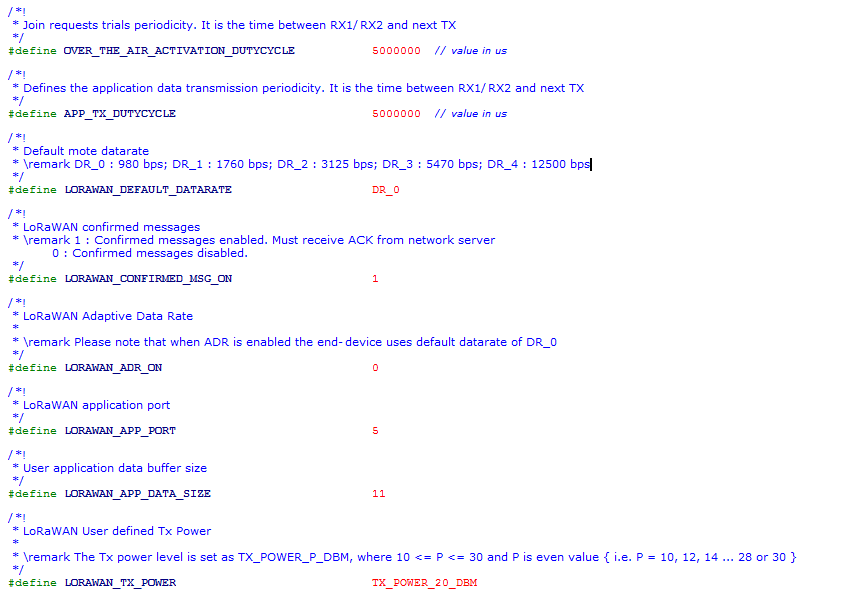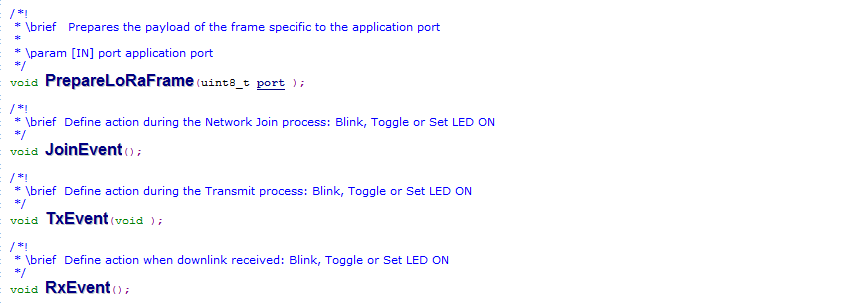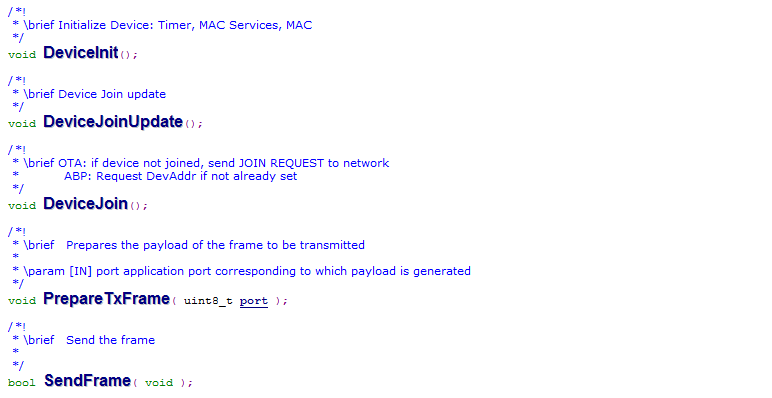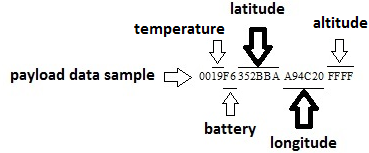Demonstration of Class-A LoRaWAN device using NAMote-72
Dependencies: LoRaWAN-lib mbed lib_mpl3115a2 lib_mma8451q lib_gps SX1272Lib
Dependents: LoRaWAN-NAMote72-BVS-confirmed-tester-0-7v1_copy
LoRaWAN-NAMote72 Application Demo is a Class-A device example project using LoRaWAN-lib and SX1272Lib libraries.
This project is compliant with LoRaWAN V1.0.1 specification.
Comissioning.h (LoRaWAN Network Configuration)
The end-device can be activated in one of the two ways:
Over the Air (OTA) activation can be enabled as shown in the figure below.

The end-device must be configured with the following parameters:
LORAWAN_DEVICE_EUI(8 Bytes) : Fist 3 Bytes is the Organizationally Unique Identifier (OUI) followed by 5 bytes of unique ID. If not defined by user, then the firmware automatically assigns one to the end-deviceLORAWAN_APPLICATION_EUI(8 Bytes)LORAWAN_APPLICATION_KEY(or DEVKEY) (16 Bytes)

Activation by Personalization (ABP) can be enabled as shown in the figure below.

The end-device must be configured with the following parameters:
LORAWAN_DEVICE_ADDRESS(4 Bytes) : If not defined by user, then the firmware automatically assigns one to the end-deviceLORAWAN_NWKSKEY(16 Bytes)LORAWAN_APPSKEY(16 Bytes)

Config.h (LoRaWAN Communication Parameters)
- Mode of Operation : Hybrid
If the end-device needs to be configured to operate over 8-channels, then
Hybrid Modeneeds to be enabled
- Mode of Operation : Frequency Hop
If the end-device needs to be configured to operate over 64-channels, then
Hybrid Modeneeds to be disabled
- Delay between successive JOIN REQUESTs :
The delay between successive Join Requests (until the end-device joins the network) can be configured using the parameter
OVER_THE_AIR_ACTIVATION_DUTYCYCLE
- Inter-Frame Delay :
One can change the delay between each frame transmission using
APP_TX_DUTYCYCLEIt is advisable thatAPP_TX_DUTYCYCLEis greater than or equal to 3sec.
- Data Rate :
The data rate can be configured as per LoRaWAN specification using the paramter
LORAWAN_DEFAULT_DATARATE. The range of values are DR_0, DR_1, DR_2, DR_3 and DR_4
- Confirmed/Unconfirmed Messages :
The uplink message or payload can be chosen to be confirmed or unconfirmed using the parameter
LORAWAN_CONFIRMED_MSG_ON. When set to 1, the transmitted messages need to be confirmed with anACKby the network server in the subsequent RX window. When set to 0, noACKis requested.
- ADR ON/OFF :
The ADR can be enabled or disabled using the parameter
LORAWAN_ADR_ON. When set to 1, ADR is enabled and disabled when set to 0.
- Application Port :
The application port can be set using parameter
LORAWAN_APP_PORT.
- Payload Length :
The lenght of the payload (in bytes) to be transmitted can be configured using
LORAWAN_APP_DATA_SIZE
- Transmit Power :
The transmit power can be configured using
LORAWAN_TX_POWER(LoRaMAC verifies if the set power is compliant with the LoRaWAN spec and FCC guidelines)

Main.cpp (Device State Machine)
The end-device state machine is defined.
- Initial State : Device is initialized.
- Join State : For OTA, Join Request is transmitted to the network until Join Accept is received by the end-device. Join event function is called that sets Red LED ON.
- Send State : Transmit payload frame is prepared. Tx event is called that blinks the Red LED indicating uplink transmission.
- Cycle State : Next packet transmission is scheduled
LoRaEventProc.cpp (Events and On-board Application)
Define events during Join, Tx & Rx. Prepare TX packet by appending with appropriate application data.

- PrepareLoRaFrame(uint8_t port ) :
Prepare LoRa payload frame with on-board application data such as GPS, Temperature, Battery, etc. LoRa.ApplicationCall(AppType ) calls application AppType defined in
LoRaApp.cpp. AppType is defined inLoRaApp.h

LoRaApp.cpp
User-defined applications such as GPS, Temp, Accelerometer, LED indications etc. Event based actions such as LED blink on Tx, LED toggle on downlink etc

LoRaDeviceStateProc.cpp
Process function calls corresponding to different Device states

LoRaMacLayerService.cpp
Define MAC Layer Services: MLME & MCPS
Serial Terminal Display
By using a serial port connection using applications such as teraterm or putty, one can view the status of the End-Device. Once the End-Device Joins the network, transmission parameters such as payload data, application port, message type etc. are displayed on the terminal.

Default Application Payload
This application defaults to sending uplink data to logical port 5. The application payload consists of:

Sample Application Payload Calculation for Longitude/Latitude
Payload => 00 19 F6 352BBA A94C20 FFFF
Temperature Calculation
19H => 2510
Temp = 25/2 = 12.5 oC
Battery Level
FFH => 100 %
F6H => 96.5 %
Longitude Calculation
longitude = A94C20H => 1109507210
longitudinal coordinate = -360 + (longitude10 x 180/(223))
longitudinal coordinate = -121.93
Latitude Calculation
latitude = 352BBAH = 348460210
latitude coordinate = (latitude10 x 90/(223-1))
latitude coordinate = 37.39
system/crypto/cmac.cpp
- Committer:
- ubhat
- Date:
- 2016-05-17
- Revision:
- 0:69f2e28d12c1
File content as of revision 0:69f2e28d12c1:
/**************************************************************************
Copyright (C) 2009 Lander Casado, Philippas Tsigas
All rights reserved.
Permission is hereby granted, free of charge, to any person obtaining
a copy of this software and associated documentation files
(the "Software"), to deal with the Software without restriction, including
without limitation the rights to use, copy, modify, merge, publish,
distribute, sublicense, and/or sell copies of the Software, and to
permit persons to whom the Software is furnished to do so, subject to
the following conditions:
Redistributions of source code must retain the above copyright notice,
this list of conditions and the following disclaimers. Redistributions in
binary form must reproduce the above copyright notice, this list of
conditions and the following disclaimers in the documentation and/or
other materials provided with the distribution.
In no event shall the authors or copyright holders be liable for any special,
incidental, indirect or consequential damages of any kind, or any damages
whatsoever resulting from loss of use, data or profits, whether or not
advised of the possibility of damage, and on any theory of liability,
arising out of or in connection with the use or performance of this software.
THE SOFTWARE IS PROVIDED "AS IS", WITHOUT WARRANTY OF ANY KIND, EXPRESS
OR IMPLIED, INCLUDING BUT NOT LIMITED TO THE WARRANTIES OF MERCHANTABILITY,
FITNESS FOR A PARTICULAR PURPOSE AND NONINFRINGEMENT. IN NO EVENT SHALL THE
CONTRIBUTORS OR COPYRIGHT HOLDERS BE LIABLE FOR ANY CLAIM, DAMAGES OR OTHER
LIABILITY, WHETHER IN AN ACTION OF CONTRACT, TORT OR OTHERWISE, ARISING
FROM, OUT OF OR IN CONNECTION WITH THE SOFTWARE OR THE USE OR OTHER
DEALINGS WITH THE SOFTWARE
*****************************************************************************/
//#include <sys/param.h>
//#include <sys/systm.h>
#include <stdint.h>
#include "aes.h"
#include "cmac.h"
#include "utilities.h"
#define LSHIFT(v, r) do { \
int32_t i; \
for (i = 0; i < 15; i++) \
(r)[i] = (v)[i] << 1 | (v)[i + 1] >> 7; \
(r)[15] = (v)[15] << 1; \
} while (0)
#define XOR(v, r) do { \
int32_t i; \
for (i = 0; i < 16; i++) \
{ \
(r)[i] = (r)[i] ^ (v)[i]; \
} \
} while (0) \
void AES_CMAC_Init(AES_CMAC_CTX *ctx)
{
memset1(ctx->X, 0, sizeof ctx->X);
ctx->M_n = 0;
memset1(ctx->rijndael.ksch, '\0', 240);
}
void AES_CMAC_SetKey(AES_CMAC_CTX *ctx, const uint8_t key[AES_CMAC_KEY_LENGTH])
{
//rijndael_set_key_enc_only(&ctx->rijndael, key, 128);
aes_set_key( key, AES_CMAC_KEY_LENGTH, &ctx->rijndael);
}
void AES_CMAC_Update(AES_CMAC_CTX *ctx, const uint8_t *data, uint32_t len)
{
uint32_t mlen;
uint8_t in[16];
if (ctx->M_n > 0) {
mlen = MIN(16 - ctx->M_n, len);
memcpy1(ctx->M_last + ctx->M_n, data, mlen);
ctx->M_n += mlen;
if (ctx->M_n < 16 || len == mlen)
return;
XOR(ctx->M_last, ctx->X);
//rijndael_encrypt(&ctx->rijndael, ctx->X, ctx->X);
aes_encrypt( ctx->X, ctx->X, &ctx->rijndael);
data += mlen;
len -= mlen;
}
while (len > 16) { /* not last block */
XOR(data, ctx->X);
//rijndael_encrypt(&ctx->rijndael, ctx->X, ctx->X);
memcpy1(in, &ctx->X[0], 16); //Bestela ez du ondo iten
aes_encrypt( in, in, &ctx->rijndael);
memcpy1(&ctx->X[0], in, 16);
data += 16;
len -= 16;
}
/* potential last block, save it */
memcpy1(ctx->M_last, data, len);
ctx->M_n = len;
}
void AES_CMAC_Final(uint8_t digest[AES_CMAC_DIGEST_LENGTH], AES_CMAC_CTX *ctx)
{
uint8_t K[16];
uint8_t in[16];
/* generate subkey K1 */
memset1(K, '\0', 16);
//rijndael_encrypt(&ctx->rijndael, K, K);
aes_encrypt( K, K, &ctx->rijndael);
if (K[0] & 0x80) {
LSHIFT(K, K);
K[15] ^= 0x87;
} else
LSHIFT(K, K);
if (ctx->M_n == 16) {
/* last block was a complete block */
XOR(K, ctx->M_last);
} else {
/* generate subkey K2 */
if (K[0] & 0x80) {
LSHIFT(K, K);
K[15] ^= 0x87;
} else
LSHIFT(K, K);
/* padding(M_last) */
ctx->M_last[ctx->M_n] = 0x80;
while (++ctx->M_n < 16)
ctx->M_last[ctx->M_n] = 0;
XOR(K, ctx->M_last);
}
XOR(ctx->M_last, ctx->X);
//rijndael_encrypt(&ctx->rijndael, ctx->X, digest);
memcpy1(in, &ctx->X[0], 16); //Bestela ez du ondo iten
aes_encrypt(in, digest, &ctx->rijndael);
memset1(K, 0, sizeof K);
}